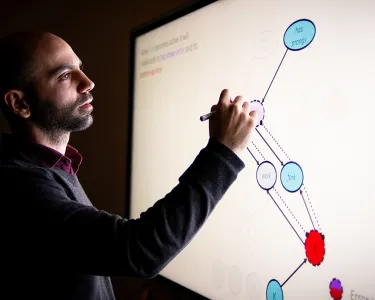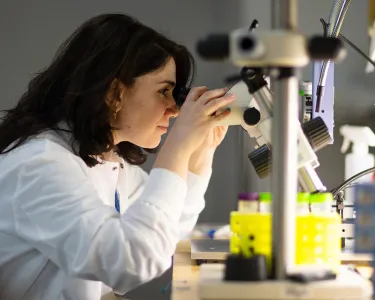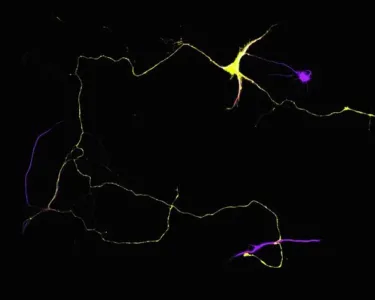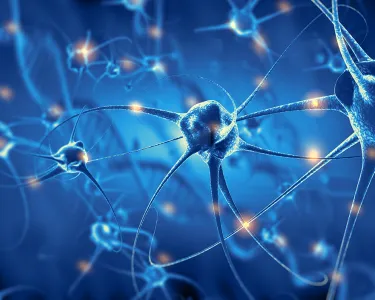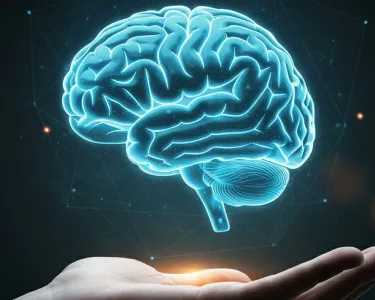Brain Health
With research programs in many areas of cellular and molecular neuroscience, Tufts’ researchers investigate the workings of the brain to explore neural networks, understand the mechanisms contributing to neurological and neuropsychiatric diseases, and improve mental health.
Uncovering the Secrets of the Mind
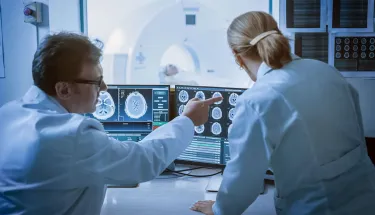
From harnessing memory processes with the goal of developing novel interventions for emotional disorders, to studying the neuromechanics of locomotion, to investigating how humans combine information from the different senses with prior information, neuroscientists, psychologists, biologists, and others at Tufts study a broad range of topics that shed light on the workings of the brain.
Areas of focus include:
Clinical neuroscience of neurological and neuropsychiatric disorders: Researchers in Tufts’ Department of Psychology search for ways to mitigate emotional disorders, investigate the neural mechanisms mediating language comprehension and production in healthy adults, examine brain function and cognition in patients with anxiety disorders, and explore the neurobiological mechanisms that contribute to individual differences in stress responsivity.
Movement: Professor Barry Trimmer in the Department of Biology focuses on the neuromechanics of locomotion, studying mechanisms of sensation and how animals detect and respond to noxious stimuli.
Cognitive neuroscience: Experts in this area address how we combine information from the different senses with prior information into a coherent picture of ourselves, our bodies, and the world around us; investigate the mental processes involved in making, perceiving, and responding to music; and elucidate the cognitive and neural mechanisms supporting human learning, memory, and cognitive control.
Computational neuroscience: Researchers from across disciplines combine psychophysics and neuroscientific methods with mathematical and computational modeling and seek to uncover fundamental physical principles that underlie the formation of functional neuronal networks in the brain.
Cognitive and brain science: Scientists in the Department of Psychology examine the mental representation of information, investigate the underlying mechanisms of cognition—with a particular focus on multitasking—and study how people experience, express, and regulate their emotions.
Addiction and transgenerational inheritance: Researchers in this area focus on neural and endocrine consequences of female opioid use and investigate the molecular changes that mediate opioid addiction and relapse.
Selected Research
Research Highlights
-
Shedding Light on Alzheimer's Disease
Tufts experts are looking at what happens to aging minds, the links between gum disease and Alzheimer’s, how common viruses might trigger the onset of Alzheimer’s, as well as what links might exist between the disease and herpes, and how green tea and resveratrol reduce Alzheimer’s plaque.
-
Studying Depression
In studies of depression—along with anxiety and personality traits—researchers are exploring PTSD's biological origins, the reasons why the brain's emotional hub switches to negative states, how to treat postpartum depression, and the causes of selfishness. And with a grant from the Massachusetts Life Sciences Center, Tufts University School of Medicine experts are investigating depression in women.
-
Understanding Brain Cell Function
Tufts researchers have uncovered a new function performed by nearly half of brain cells and identified a brain pathway that connects to hunger and overeating.
-
Leading Research Centers
The Center for Neuroscience Research and the Stibel Dennett Consortium for Brain and Cognitive Science are clearing the path for future groundbreaking research. And central to the workings of the Neuroscience Department at the School of Medicine are robust programs in postdoctoral training and graduate-level education.
-
Treating Neurobiological Disorders
Tufts’ neuroscience research labs are investigating the mechanisms of neurobiological disorders to improve therapeutic approaches to treating mental health, with a specific focus on drug development and discovering new drug targets for preclinical research.


